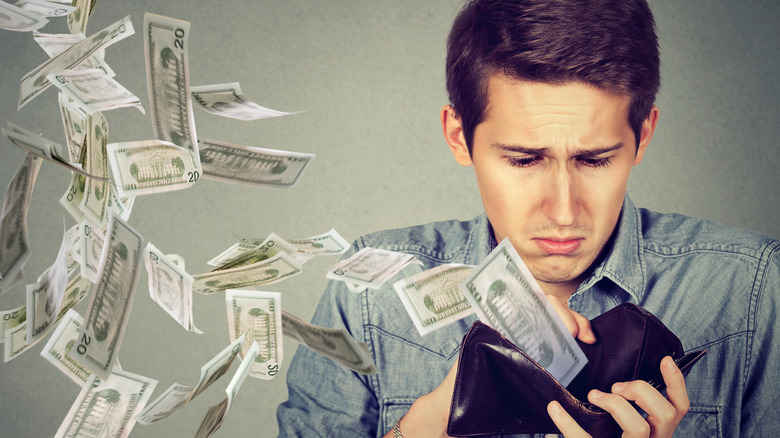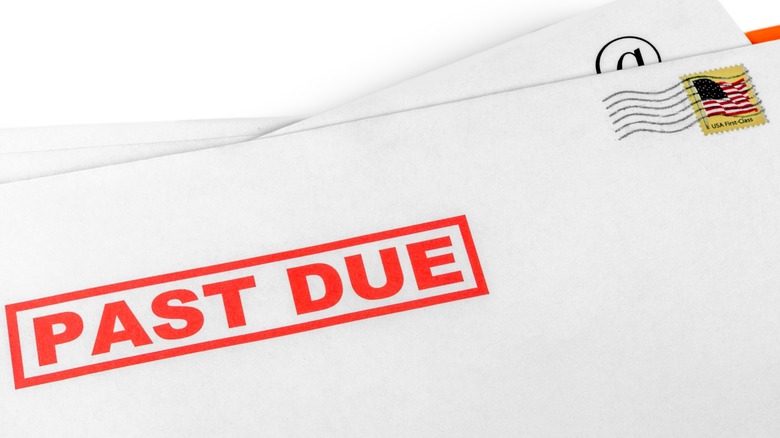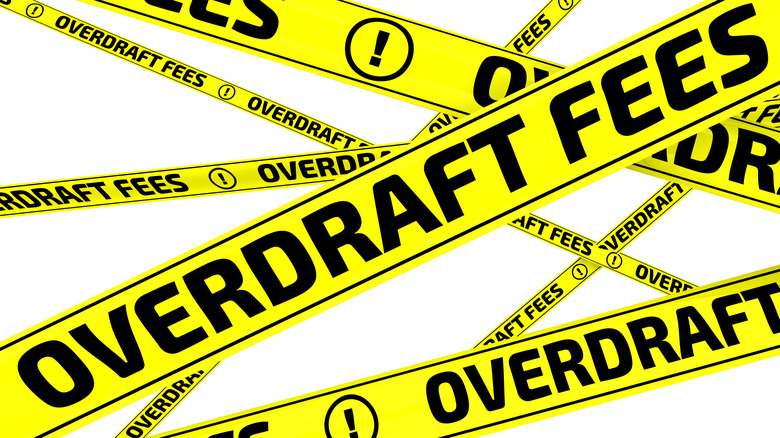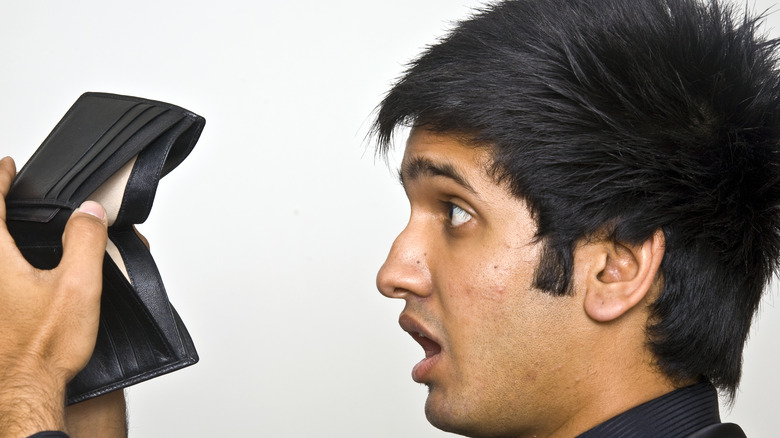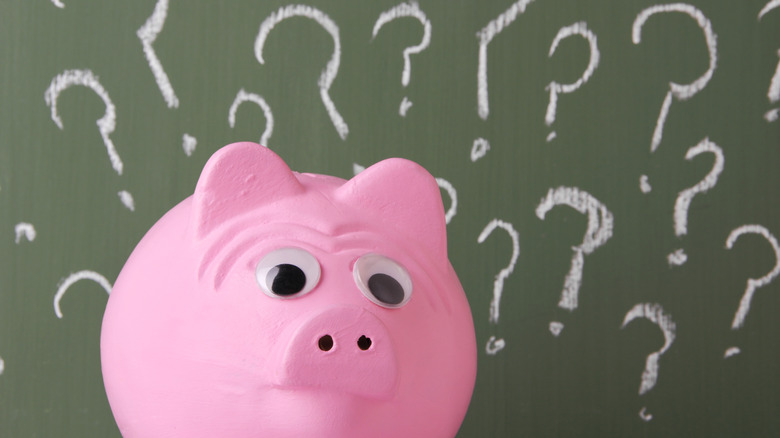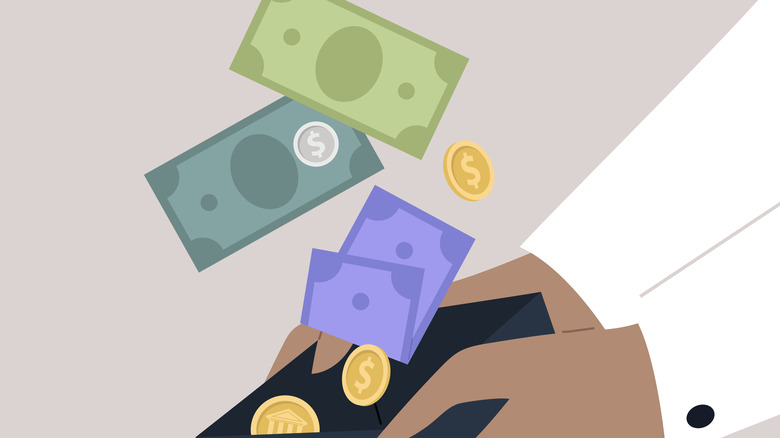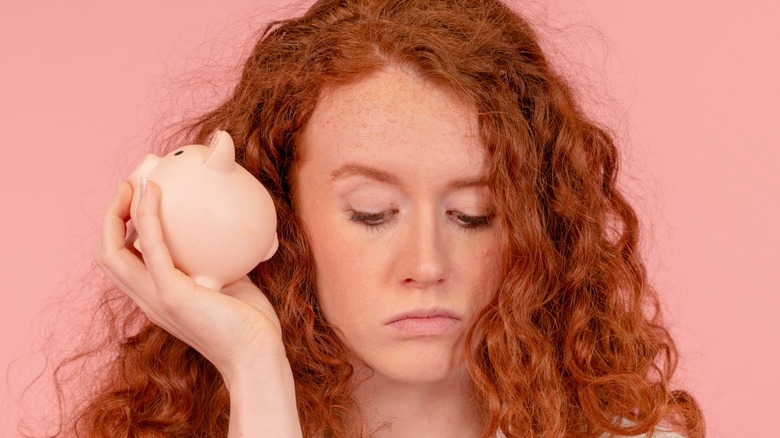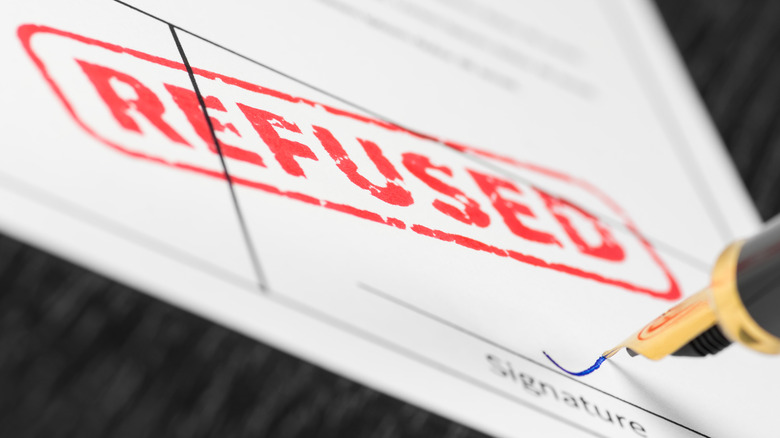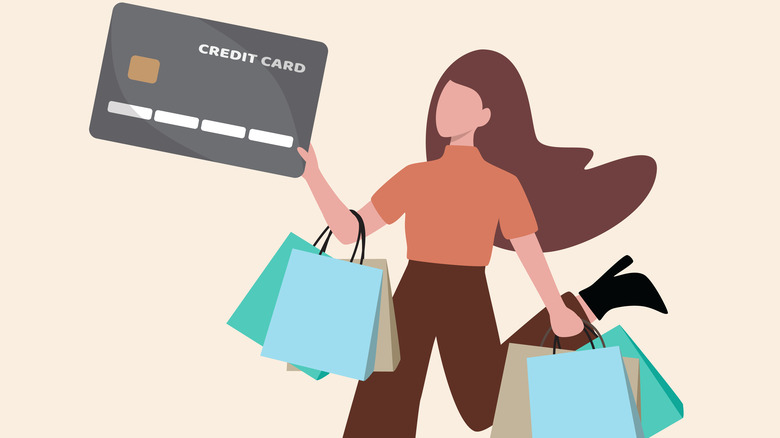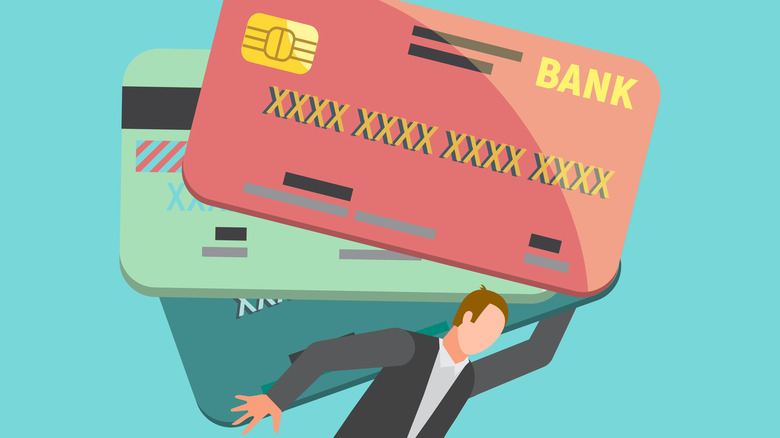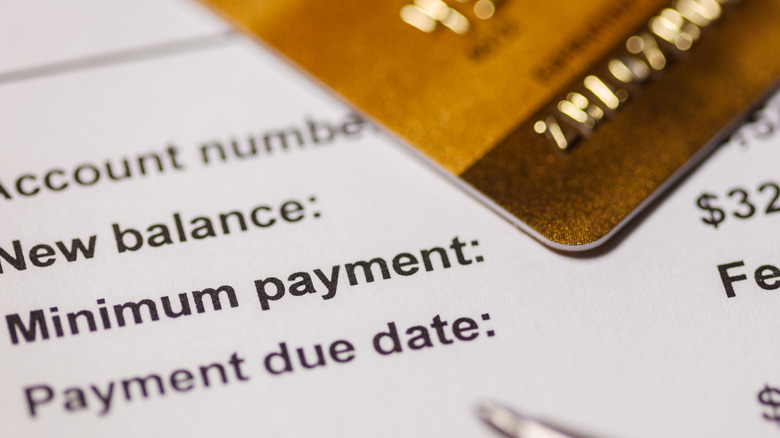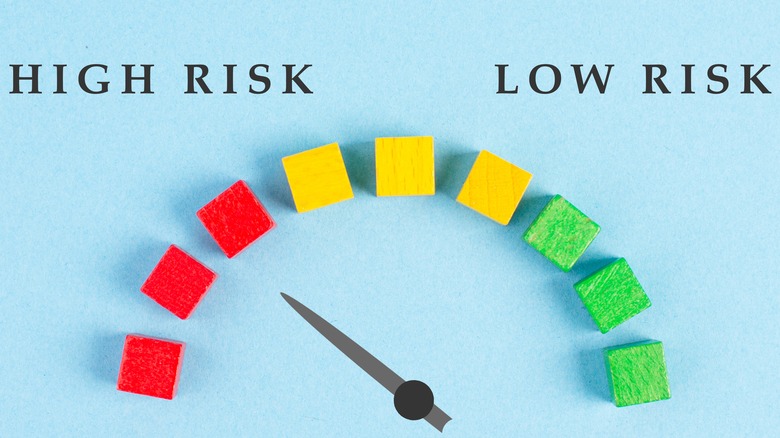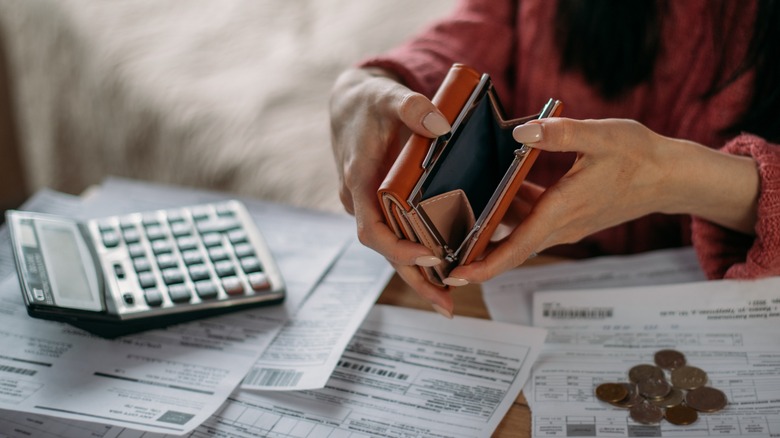Warning Signs You're Probably Terrible With Money
Knowing how to manage money effectively is an important skill, but it's not one that comes naturally to everyone. This list of warning signs indicates less-than-ideal money management. Reflect honestly on which ones — if any — apply to you, and what that may mean for your finances. If some of these items resonate with you, don't despair — this doesn't necessarily mean you're terrible with money. However, it certainly may mean that you could benefit from a bit of improvement when it comes to money management. If you do recognize some of your financial habits in this list, taking steps to improve is surely in your best interest.
Once you're aware of your biggest money management challenges, then you'll be able to start making some changes for the better. The actions you take now to improve your financial habits can have a positive impact on your financial well-being, both now and in the future.
Regularly incurring late payment fees
Regularly racking up late fees on your bills is a sure sign that your money management skills need more than a little improvement. Everyone can sometimes experience the problem of having more expenses than money, but that's why taking care of important bills shouldn't be last on your payment priority list. Any time you don't pay a bill by its due date, the vendor or creditor is going to add on a late fee and maybe even interest as well. As a result, a bill that goes unpaid when it's due is ultimately going to cost you a whole lot more in the long run.
When you can't or don't pay your bills on time, the late fees and past-due penalties will just keep adding up. That's why bills should be the first things you pay when you get your paycheck or otherwise benefit from an influx of money. This is the only way to keep from having to spend way more than the original cost of the bill in order to get caught up.
Overdrawing your bank account
Overdrawing your bank account is a sure sign of poor financial skills. Sure, your bank account may have overdraft protection that will keep you from actually bouncing a check or debit transaction, but that comes at a price. According to the Federal Deposit Insurance Corporation (FDIC), banks typically charge an overdraft fee of around $35 per transaction. If you don't have overdraft protection, the business you gave a bad check will charge you a returned check fee and your bank will charge you an insufficient funds (NSF) fee.
Whatever you were trying to buy that you didn't have enough money to pay for will ultimately still cost you that same amount, plus significant fees. The cost of overdrawing your bank account can be even higher, as banks can refuse to do business with people who consistently carry a negative balance or don't correct overdrafts promptly. You can't count on simply opening an account elsewhere. Banks check for a history of this kind of behavior before opening new accounts, so people who are in the habit of going upside down may not be able to get a traditional bank account.
Running out of money before payday
Running out of money in between paydays could be caused by a variety of factors. If you're in a low-paying job, then finding a better job or adding a side hustle may help. However, if you're already making good money and just can't make it last from one pay cycle to the next, that's another matter entirely. If your paycheck used to cover your bills and now it doesn't, this could be related to shrinkflation or changes in your lifestyle or spending habits. However, if this has been a long-term problem, the issue could be directly related to a lack of financial savvy.
Regardless of why you regularly run short of funds, it's important to figure out how to make your money last in between paychecks. If your money isn't going far enough to cover your expenses, the only way to keep from digging a financial hole that'll grow deeper and deeper is to reduce your spending or increase your income. Don't lose sight of the fact that earning more money isn't likely to be the sole solution. After all, in a recent SmartAsset survey, over half of the respondents who reported earning a six-figure salary also indicated that they're living payday to payday. Even if you are able to get a raise or otherwise make more money, it's still important to make wise decisions about how you spend it.
Not realizing where your money is going
When you first get paid, it can feel really good to see the money from your paycheck in your bank account. Now, if only it would stay there. However, a bank balance can certainly dwindle quickly. By the time you pay your rent or house payment and buy some groceries, a chunk of your money is gone. That's to be expected, though, as food and housing are major expenses. However, sometimes the bank account seems to dwindle way before major expenses like those are paid. What's up with that?
When it comes to expenses, little things add up and every cent really does count. If you often find yourself being shocked by how low your bank balance has become, without actually having paid any major bills, that's a sign that you don't have a good sense of where your money is going and that your spending may be out of control, even if you don't buy expensive items. If you continually feel puzzled by where your money is going, start keeping a real-time list of everything that you spend money on — even small vending machine purchases and other small items. This will help you get a clear picture of where your money is going, which is a first step toward learning how to manage your funds. Soon, you may even be ready to start building a budget.
Not setting (and following) a budget
Speaking of building a budget, it's a fact that budgeting is among the most basic of all money management skills. Failing to set a budget for yourself is a recipe for financial disaster. Without a budget to follow, there's no concrete plan to help guide your spending, which can quickly lead to serious cash flow issues. Setting a budget is the best way to know how much money you need to pay your bills and other ongoing expenses and how much — if any — money you have left to use for other things.
A budget is one of the most important tools you can use to take control of your spending. It can help you properly prioritize your spending to cover your expenses and use your money wisely. Without a budget, it's all too easy to spend money that should be going toward paying your bills on items that you don't need and can't afford, and then find yourself in the position of being unable to pay your bills.
You don't have an emergency fund
If you don't have an emergency fund set aside, that's a big red flag indicating a lack of financial savvy. Being able to pay your bills is great, and it's even better when you have some money left over for other things. But some of those disposable funds need to find their way into a savings account that's designated for emergency use only. After all, major expenses like car repairs or unexpected medical bills can strike at any time, as can a reduction in or loss of income. Without an emergency fund, the financial shock of scenarios like these can have a devastating impact.
The idea of starting an emergency fund can be overwhelming, especially when experts commonly recommend putting three to six months' worth of money in such a fund. However, any emergency fund is better than no emergency fund. Get started by setting a goal of $500 and go from there. If your employer will let you divert money from your paycheck to a savings account, that's a great way to begin — even if you just set aside $10 or $20 per month. You could also save up loose change on a daily basis, then deposit it into your emergency fund at the end of every week.
Opting out of your workplace retirement plan
Speaking of diverting money from your paycheck to save for the future, participating in an employer-sponsored retirement plan is a great way to do just that. If you're not participating in such a plan if one is available to you, then you're missing out on a tax break and — in most cases — free money. That's right, free money. When you divert some of your wages to a qualified retirement account (unless it's a Roth IRA), the money goes in pre-tax and your taxable income is reduced by the amount you contribute.
Also, most companies that include retirement accounts in their employee benefits package will match at least a portion of what you contribute. Your employer may give you free money — which is also not taxable income at this time — to help build your retirement savings. Certainly, it's a terrible financial strategy to turn your back on free money paired with a tax break. You will eventually pay income tax on this money, but much later, when you withdraw the money after it's had an opportunity to grow in the investment account over time.
Living beyond your financial means
Living beyond your financial means — on any scale — is an unmistakable indicator of poor money management. No one is saying that you can't have nice things, but it's never wise to go into debt to support a lifestyle that you can't afford. The fact that there's enough room on your credit card (or one of too many credit cards) to cover the cost of a purchase absolutely does not mean that you can afford whatever it is. Charging up debt to buy things you can't afford will create a long-term financial hardship that'll affect you for years to come.
If you crave designer labels, shop at consignment stores and only pay cash — or seek out suitable but less costly substitutes. If your heart desires an upscale apartment, then bring in a roommate (or two or three) — or reset your expectations to be more realistic if you'd rather not do that. Living within your means now will help you build a solid base for expanding your financial means in the future while continuing to live a lifestyle you can't afford will keep you from being able to do so.
Giving in to financial peer pressure
Peer pressure doesn't stop with the elementary school playground — it can extend well into (and throughout) adulthood. Grown-up peer pressure often involves feeling pressured by purchase-loving pals to live beyond your means or to otherwise spend excessively. It can be tough to say "no" to joining in with your friends on high-dollar vacations that aren't in your budget (or bank account) or to buying expensive items they're encouraging you to acquire, especially if doing so helps you feel like you're "keeping up" with them.
The reality is, though, that it's entirely possible that your spendy friends also can't really afford whatever it is that they're urging you to buy. Don't go into debt just to fit in. If you do, chances are that you'll find yourself in a financial hole that you'll spend years paying down. Rather than giving in, do everyone in your friend group a favor by suggesting a much less expensive getaway that'll still be a ton of fun or by being brave enough to say that what they're suggesting sounds great but isn't something you can afford. The example you set will not only help you, but it may also help other friends curb their own bad financial habits or become more comfortable saying no to peer pressure.
Carrying a balance on credit cards
It's easy to buy things with a credit card, but it's not so easy to pay off a credit card balance. Sure, getting a credit card can help you build a credit history — but only if you use the account responsibly, which means paying it off quickly. Charging up a credit card and carrying a balance on it may just be the epitome of terrible money management. The only thing that's really worse is to do the same thing with multiple credit cards. Credit cards are revolving accounts with very high-interest rates. Sure some credit card companies offer low introductory rates or even 0% interest for a short period of time. But that doesn't last. If you don't pay off any balance by the time the offer ends, your rate is going to go way up.
The exact amount depends on the specifics of your account. In November of 2023, Forbes Advisor reported an average credit card interest rate of 27.3%. That amount will be added at the end of your credit cycle and carried over, with interest continuing to accrue. Each month you'll pay interest on the full balance — which includes previously charged interest, new purchases, and past purchases. Carrying credit card balances leads to a vicious cycle of debt with potentially devastating financial consequences.
Making minimum credit card payments
It's ideal to pay your credit card off in full every month, as that's the best way to avoid the trap of credit card debt. If you already have a high balance, that might not be a realistic starting point. Instead, you need to make a plan to get the account paid off as quickly as you can. Such a plan does not involve limiting your payments to the minimum amount. That line item on your credit card statement benefits the credit card company way more than it benefits you. CNBC tested this concept by calculating how long it would take to pay off around $6,200, the average amount of credit card debt in the U.S. at the time of the study, by making only minimum payments.
They discovered that it would take 17 years to pay off this balance, assuming that no further charges were made and no late payment fees were incurred, with the accountholder ultimately paying well over double the initial balance. CNBC used an interest rate of just over 16.5% for this calculation, much lower than the average interest rate. The same balance would actually cost most credit cardholders a lot more, and take even longer to pay off. The only time you should consider making a minimum payment is when your only other option would be to pay nothing at all because missing a monthly credit card payment is even more costly than paying only the minimum.
Having a low credit score
A person's credit score is based on a variety of factors, all of which are considered to be strong indicators of how risky it is to loan money to them. If you have a low credit score, unless the reason is that you have no credit history at all, then something in your payment history or credit usage habits is viewed by lenders as a red flag for high risk. A low credit score could mean that you've never borrowed money or have experienced financial hardship. However, it could also mean that you have really poor financial habits. Regardless of the reason, having a low credit score will make it difficult for you to borrow money at a reasonable interest rate — or even at all.
Rather than dwelling on whether the number on your credit report means you're truly terrible with money or not, it's important to accept that prospective creditors are likely to view it that way. That perspective can help make it abundantly clear that it's in your best interest to take steps to improve your credit score. Bonus: Everything that'll help boost your credit score can also positively impact other aspects of your finances.
Being stressed out about money all the time
If you regularly feel stressed out about money, this means that the state of your finances — whatever your individual situation — is negatively impacting your emotional well-being and possibly your physical health as well. A person can feel financial stress for a lot of reasons, many of which may be related to how they manage (or fail to manage) their own money, spending, or debt. However, financial stress can also be related to things like wages or earning potential, dealing with financial red flags in a partner, trying to help loved ones with financial hardship, or a variety of other factors.
Whatever the cause of your financial stress, it's important to take steps to overcome the challenges that you're facing so you can minimize or prevent this type of stress. Putting a stop to bad money habits can help, as can taking steps to boost your income or to remove yourself from situations that are not good for you or your finances. You may find it helpful to try to apply some of the daily habits of the world's wealthiest people. Hint: None of them involve spending lots of money, and all of them are within your reach.
